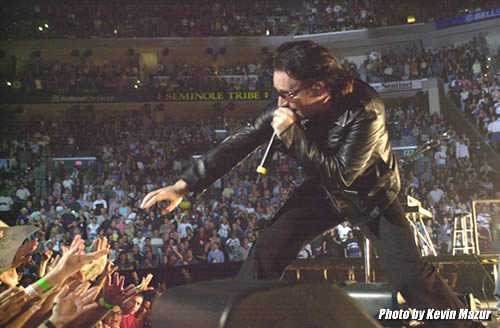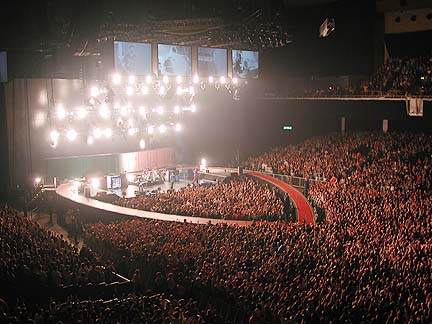
Bono delivers the rock and roll sermon
November 12, 13, & 19
"In the Name of Healing"
U2 at the Staples Center

Bono delivers the rock and roll sermon
Excerpt from Hilburn's Review:
U2's hits, recharged with Bono's
sincerity, powerfully resonate with new meaning in the post-Sept. 11 world,
writes Robert Hilburn of the Los Angeles Times.
Growing up in Ireland, I was not fond of flags," Bono said Monday during U2's
emotionally charged concert at Staples Center. "Until a few weeks ago, I
wouldn't have felt the way I do about that flag either."
The singer was staring at a U.S. flag draped over a drum kit, adding that he has
long been suspicious of patriotism because of Northern Ireland's history of
killings in the name of God and country. But the terrorist attacks of Sept. 11
made him realize his own deep affection for the United States, and have made him
comfortable with the nation's grandest symbol.
"Something about the words 'rock 'n' roll' and
'freedom' that feels like the same thing," he added, introducing the night's
chief song of unity by dramatically raising a single index finger over his head.
Almost immediately, the band began playing "One," U2's greatest song of healing,
defined by its caressing melody and lyrics such as, "We get to carry each
other." People have turned to "One" for comfort in various ways since it was
included on the "Achtung Baby" album in 1991, but it has rarely seemed more
powerful than on this night. Adding to the song's impact was the use of video
screens at the rear of the stage. As the band played with its usual mixture of
intensity and grace, the names of the hundreds of victims of the Sept. 11
attacks were scrolled across the screen.
It's as easy in this cynical era to be suspicious of this kind of warm,
openhearted gesture as it is to worry about blind allegiance to symbols. But the
magic of U2 has been its ability to operate for two decades with an absolute
sincerity and conviction.
It was difficult Monday night to imagine that U2 was widely ridiculed in parts
of the rock community early in its career for being overly serious and, even,
self-righteous.
How dare Bono, guitarist Edge, drummer Larry Mullen Jr. and bassist Adam Clayton
have the nerve to employ the name of the Rev. Martin Luther King in a song about
high ideals or speak in interviews about rock 'n' roll as a meaningful social
force?
These, of course, are the qualities that now have U2 widely seen as the greatest
of rock's post-'60s bands - a group whose ambition, depth and deeply rooted
humanism is all the more resonant in the anxieties of the day.

U2's heart shaped stage allows them to circulate into the crowd
A lot of their songs were written many years ago about war, conflict, peace, etc from their IRA terror experiences, and wrapped around the September 11th theme made it a pretty powerful and emotional concert. I think I would say it was a concert of epic proportions.
I bought some tickets off of Ebay, so the wife and I stood about 15 feet from the heart shaped outer portion of the stage. Kinda sucked because we couldn't move for 3.5 hours (No Doubt opened for them, and if you left your spot, you would never be able to push your way back through the crowd), but it was worth it when Bono and the Edge are 15 feet in front of you playing a song.
No Doubt was okay, lots of energy, but their "Teen age female angst and party spirit" puts them squarely in the pop group category, and they seemed extremely shallow compared to U2. U2 reminds people why Epic Rock and Roll can make a person rethink how they live their life, and remember what is really important in the world. I saw people in the audience with tears in their eyes during "One" as the names of the victims of September 11th scrolled by on the 10 foot high, 50 foot wide video monitors behind the band. They played an awesome 110 minute set. More stuff at www.u2.com. Also interesting interpretations of U2's lyrics at http://www.dtek.chalmers.se/~d4jonas/U2MoL/index.shtml.